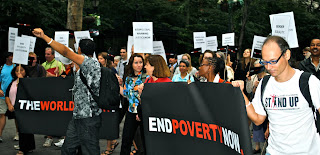Audiencias de las ONGs y la Sociedad Civil
sobre los ODM
14 y 15 de junio
Nueva York
14 y 15 de junio
Nueva York
En el marco de las AUDIENCIAS INTERACTIVAS INFORMALES organizadas por la Asamblea General de las Naciones Unidas con las ONGs, las OSCs y el sector privado los días 14 y 15 de junio en la sede de Nueva York, el GCAP, el Equipo de Trabajo Feminista del GCAP (FTF) y otras organizaciones de la sociedad civil han realizado distintas acciones de información y de movilización, incluyendo la Marcha "EL MUNDO QUE QUEREMOS" el lunes 14 a la mañana y una charla sobre "Igualdad de género y reducción de la exclusión social para alcanzar los ODM".
Además, la carta con nuestras demandas sobre los ODM y la evaluación de los mismos que se realizará en septiembre de este año, ya se entregó a los Embajadores de Dinamarca y Senegal, quienes van a estar co-facilitando la evaluación durante la Assamblea General por lo cual, en estos días, también están redactando la Declaración final o "Outcome Document".
La Directora de las Campañas del GCAP, Lysa John, participó en la reunión con los co-facilitadores y dijo que recibieron la carta con mucho interés y entusiasmo y durante la reunión se presentó en más detalle las 9 demandas de la carta.
La Directora de las Campañas del GCAP, Lysa John, participó en la reunión con los co-facilitadores y dijo que recibieron la carta con mucho interés y entusiasmo y durante la reunión se presentó en más detalle las 9 demandas de la carta.
COMUNICADO DE PRENSA EN INGLÉS:
Ground-breaking Poverty Hearings at United Nations
Activists Demand `The World We Want'
Activists Demand `The World We Want'
THE UNITED NATIONS, 14 JUNE 2010 -- Hundreds of Prominent and grassroots anti-poverty campaigners from Africa, Asia, Australia, Europe, Latin America and North America marched to Dag Hammarskjöld Plaza outside the United Nations today to demand urgent and concrete actions to reach and exceed the Millennium Development Goals.
The activists are in New York to participate in ground-breaking hearings at the United Nations, where for the first time civil society, private sector and government delegates are meeting together on the floor of the General Assembly. The interactive meetings are being held ahead of a high-profile summit at the UN in September, where global leaders are expected to take measures to accelerate progress towards the Millennium Development Goals.
“Governments seem to be suffering from a collective infliction – memory loss,” says Lysa John, Campaign Director of the Global Call to Action Against Poverty (GCAP). “They agreed on a framework and concrete targets to dramatically reduce extreme poverty by 2015. But with less than five years to go, we are way off track. We urgently need legally binding mechanisms to ensure that governments keep their promises alongside a global breakthrough plan to end extreme poverty.”
Ms. John joined international campaigners outside the UN in signing a giant letter of demands, addressed to the U.N. Secretary-General Ban Ki-Moon. The letter, which was also signed by more than 120 civil society groups across the globe, calls for greater accountability, measures to increase gender equality and reduce social exclusion and concrete urgent steps to achieve MDG8, a global partnership for development focused on justice, sustainability and fair trade.
Anti-poverty campaigners are also demading an increased focus on social exclusion and discrimination as well as legally binding accountability mechanisms.
“We are calling for the World We Want 2015 because we are not happy with the World we live in today,” says Gemma Adaba of the International Trade Union Confederation, “a world where children are denied the opportunity to go to school and neoliberal polices dicate that education is a service that must be paid for. The World We Want is a world where there is education for all, health, water, decent work, universal social protection floor and dignity for all.”
“We need Governments to be accountable to the citizens of the world and fulfil the internationally agreed commitments they have made,” adds Mr. Irungu Houghton, Oxfam's Pan-African policy advisor. “Poverty has reached emergency proportions. Urgent action is needed. We can not afford a business-as-usual approach.”
Leaders from 189 countries signed The Millennium Declaration in 2000, setting out eight clear cut time-bound commitments to end poverty. While some progress and significant achievements have been made, the Millennium Development Goals (MDGs) are not on track to be achieved by the 2015 deadline, due in part to the feminisation of poverty, the ever more apparent affects of climate change and the global financial and food crises. In 2009 alone, an estimated 90 million people – mostly women and girls - were pushed into poverty.
Media Contacts
Rajiv Joshi
email: Rajiv@whiteband.org
Tel: +1 917 545 6101
Michael Switow
email: switow@gmail.com
Tel: +1 502 298 3818



No hay comentarios:
Publicar un comentario